Ving作表语定语宾补定语资料讲解
- 格式:ppt
- 大小:786.00 KB
- 文档页数:37
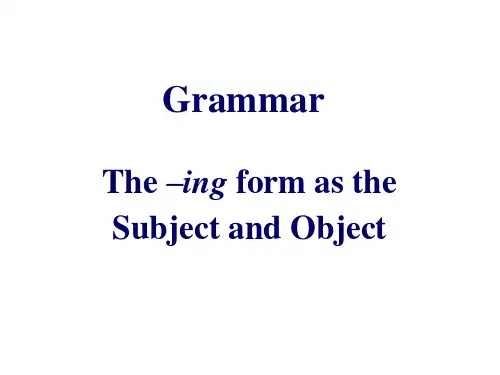

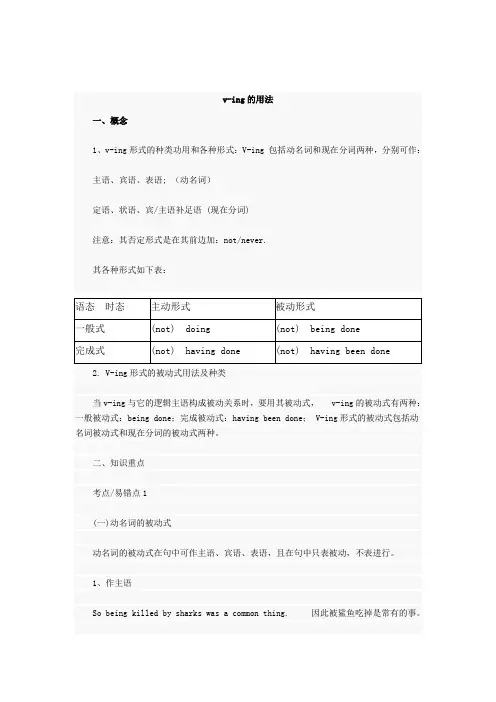
v-ing的用法一、概念1、v-ing形式的种类功用和各种形式:V-ing 包括动名词和现在分词两种,分别可作:主语、宾语、表语; (动名词)定语、状语、宾/主语补足语 (现在分词)注意:其否定形式是在其前边加:not/never.其各种形式如下表:Being laughed at in public is a terrible thing.在公共场合下被嘲笑是件可怕的事。
Being exposed to the sun does harm to health.暴漏在阳光下对身体有害。
The president's being killed led to serious consequences.总统被杀导致了严重后果。
2、作宾语V-ing形式的被动式既可作动词的宾语,也可作介词的宾语。
He was afraid of _________________ (abandon) by us.He did it without ______ _____ (ask)You can't eat anything before _____________(operate on)I remember having be en told the story.3、作表语What worried the child most was his not being allowed to visit his mother i n the hospital.使孩子最为担心的是他不被允许到医院看母亲。
What I hate most is ________________ (laugh at)The problem is for from _______________ (settle)注意:①动名词的被动式作主语和表语时,常用其一般式(being done),不习惯用完成式;但作宾语时,若其动作发生谓语动词之前或强调动作已经发生,可用其完成式(hav ing been done)。

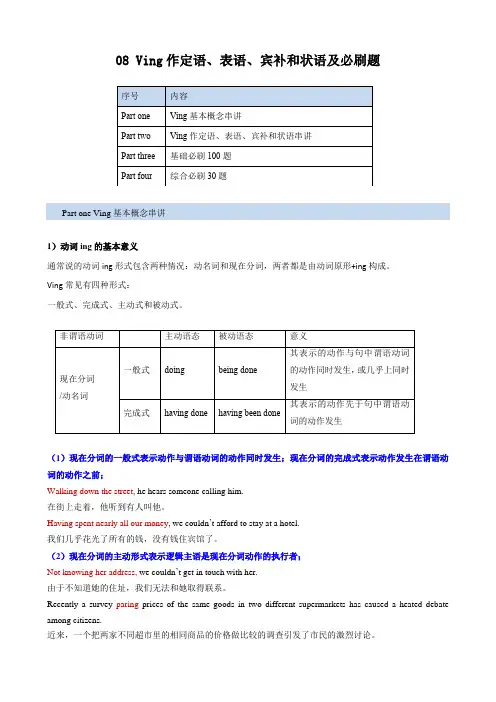
08 Ving作定语、表语、宾补和状语及必刷题1)动词ing的基本意义通常说的动词ing形式包含两种情况:动名词和现在分词,两者都是由动词原形+ing构成。
Ving常见有四种形式:一般式、完成式、主动式和被动式。
(1)现在分词的一般式表示动作与谓语动词的动作同时发生;现在分词的完成式表示动作发生在谓语动词的动作之前;Walking down the street, he hears someone calling him.在街上走着,他听到有人叫他。
Having spent nearly all our money, we couldn’t afford to stay at a hotel.我们几乎花光了所有的钱,没有钱住宾馆了。
(2)现在分词的主动形式表示逻辑主语是现在分词动作的执行者;Not knowing her address, we couldn’t get in touch with her.由于不知道她的住址,我们无法和她取得联系。
Recently a survey paring prices of the same goods in two different supermarkets has caused a heated debate among citizens.近来,一个把两家不同超市里的相同商品的价格做比较的调查引发了市民的激烈讨论。
(3)现在分词的被动形式表示逻辑主语是现在分词动作的承受者;The area being studied is called an archeological site.正在被研究的那个地方被称作考古地。
Having been asked to work overtime that evening, I missed a wonderful film.那天晚上我因被要求加班而错过了一场好看的电影。
The houses being built are for the teachers.正在建的那些房子是给老师们的。

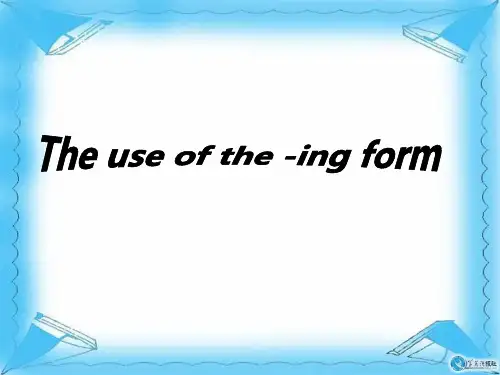
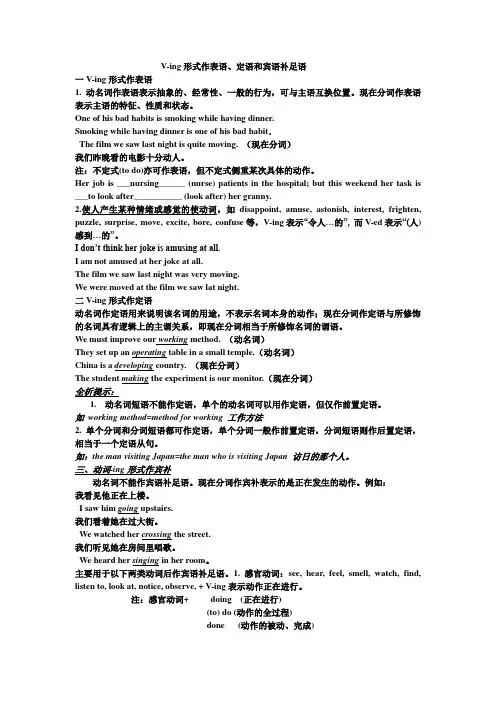
V-ing形式作表语、定语和宾语补足语一V-ing形式作表语1. 动名词作表语表示抽象的、经常性、一般的行为,可与主语互换位置。
现在分词作表语表示主语的特征、性质和状态。
One of his bad habits is smoking while having dinner.Smoking while having dinner is one of his bad habit.The film we saw last night is quite moving. (现在分词)我们昨晚看的电影十分动人。
注:不定式(to do)亦可作表语,但不定式侧重某次具体的动作。
Her job is ___nursing______ (nurse) patients in the hospital; but this weekend her task is ___to look after___________ (look after) her granny.2.使人产生某种情绪或感觉的使动词,如disappoint, amuse, astonish, interest, frighten, puzzle, surprise, move, excite, bore, confuse等,V-ing表示“令人…的”, 而V-ed表示“(人)感到…的”。
I don’t think her joke is amusing at all.I am not amused at her joke at all.The film we saw last night was very moving.We were moved at the film we saw lat night.二V-ing形式作定语动名词作定语用来说明该名词的用途,不表示名词本身的动作;现在分词作定语与所修饰的名词具有逻辑上的主谓关系,即现在分词相当于所修饰名词的谓语。


